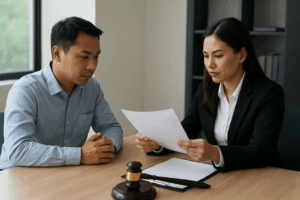In the vibrant and bustling markets of Thailand, where the aroma of street food wafts through the air and the allure of local craftsmanship beckons, there’s an abundance of treasures to discover. From exotic spices to intricately woven textiles, Thailand offers a sensory delight for both locals and expatriates alike. However, amid the excitement of exploring this cultural melting pot, it’s essential for foreign consumers to be vigilant about product safety and quality.
As a foreigner living in Thailand, you want to ensure that the goods you purchase, whether it’s electronics, food, cosmetics, or pharmaceuticals, meet stringent safety standards. Fortunately, Thai consumer protection laws are in place to safeguard your interests and provide avenues for recourse in case of purchasing defective or unsafe products.
Understanding Thai Consumer Protection Laws / consumer rights in Thailand
Thai consumer protection laws are designed to protect consumers from unfair practices and ensure the safety and quality of goods and services. These laws outline standards for product safety and quality across various industries, ranging from manufacturing to retail.
The Consumer Protection Act of Thailand is the primary legislation governing consumer rights and responsibilities. Under this law, consumers have the right to expect that products they purchase are safe for their intended use and free from defects that could pose harm. Additionally, consumers are entitled to accurate information about the products they buy, including clear labeling and instructions for use.
Product Safety Standards in Thailand
When it comes to product safety, Thailand adheres to rigorous standards to protect consumers from potential hazards. Various government agencies, such as the Food and Drug Administration (FDA) and the Department of Industrial Works (DIW), enforce regulations to ensure that products meet specified safety criteria.
For example, the FDA oversees the safety and quality of food, drugs, cosmetics, and medical devices in Thailand. Before a product can be marketed or sold in the country, it must undergo rigorous testing and evaluation to ensure compliance with FDA regulations. This includes assessments of ingredients, manufacturing processes, and labeling requirements.
Similarly, the DIW regulates the safety of industrial products, including electronics, machinery, and chemicals. Products subject to DIW oversight must meet established safety standards and undergo inspections to verify compliance. By adhering to these standards, manufacturers and importers help ensure that their products are safe for consumers.
Consumer Rights and Recourse
Despite stringent safety measures, there may be instances where consumers encounter defective or unsafe products. In such cases, it’s essential to understand your rights and the recourse available under Thai consumer protection laws.
If you purchase a product that is faulty, unsafe, or does not meet the advertised standards, you have the right to seek recourse from the seller or manufacturer. This may include requesting a refund, replacement, or repair of the product, depending on the circumstances.
Thai consumer protection laws provide avenues for resolving disputes through mediation, arbitration, or legal action if necessary. Consumer protection agencies, such as the Office of the Consumer Protection Board (OCPB), can assist consumers in filing complaints and seeking resolution.
Tips for Ensuring Product Safety
As a foreign consumer in Thailand, there are several steps you can take to ensure the safety and quality of the products you purchase:
1. Research : Before making a purchase, research the product and its manufacturer to ensure they have a good reputation for quality and safety.
2. Check Labels : Pay attention to product labels and packaging for information on ingredients, expiration dates, and safety certifications.
3. Ask Questions : Don’t hesitate to ask sellers or manufacturers about the safety and quality of their products, especially if you have any concerns.
4. Keep Records : Retain receipts, warranties, and documentation related to your purchases, as these may be necessary if you need to seek recourse.
5. Report Issues : If you encounter a defective or unsafe product, report it to the relevant authorities, such as the OCPB or the FDA, to help protect other consumers.
The Role of Bangkok Law Firms in Advocacy:
In the pursuit of LGBTQ+ equality, Bangkok law firms serve as critical allies and advocates for the community. Through legal advocacy, policy reform, and litigation, these firms work tirelessly to challenge discriminatory practices, promote inclusivity, and uphold the rights of LGBTQ+ individuals. By providing legal counsel, representation, and strategic guidance, Bangkok law firms empower LGBTQ+ individuals to assert their rights, seek justice, and effect positive change in society. Additionally, these firms play a vital role in raising awareness, educating the public, and fostering a more inclusive and equitable legal landscape for all members of the community.
Conclusion
Contact : Siam Center Law Group by calling +66(0) 2 648 5041, +66(0) 2 648 5042





